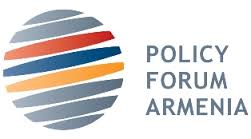Policy Forum Armenia (PFA)—a Washington-based international think tank—announces today the publication of its State of the Nation Report on “Armenia and the West: A New Vision for the Caucasus”, an earlier version of which was presented as a background paper during a high-level workshop at the Atlantic Council in Washington on July 2, 2014.
The report is intended for policymakers with interest in strengthening Armenia and its ties with the West. It offers some out-of-the-box thinking that challenges prevailing views about Western involvement in Armenia and the Caucasus. The report essentially sets aside a critical handicapping factor—Armenia’s leadership and governance—and lays out a vision for the country’s role in the region under a leadership that would enjoy widespread support among its people; understand and stay current with global trends; and maintain a reasonable degree of independence from foreign interference. The report states that, if implemented in practical terms, a leadership change of this nature will unleash Armenia’s developmental potential and effectively lead to the proposed foreign policy reorientation.
The report notes that, while Armenia owns its current problems, the West has lost a valuable opportunity to steer Armenia toward more democracy and better governance. However, recent developments in the wider region bring new opportunities for the West to forge stronger ties with Armenia. Yet, as argued in the report, this cannot be done with the current ruling regime, which has squandered the country’s economic and geopolitical potential and brought Armenia close to a point of no-return.
The report provides a thorough review of Armenia’s bilateral relations with all its neighbors and Russia. While it recognizes the gravity of the current status quo that relies heavily on Russia’s meddling in Armenia’s domestic and foreign policy choices, it proposes a way out. The report notes that the Russia’s control of Armenia is working against the long-run interests of both countries. This state of affairs is not sustainable. The challenge is to convince Russia to step back and allow Armenia to build bridges with other countries/blocks, as dictated by its own strategic interests, while still maintaining an exclusive relationship with Russia.
In his remarks, Armenia’s first Ambassador to the United States, Rouben Shougarian noted that: “The report that followed the multifaceted discussion at the Atlantic Council is both a gratifying result of a comprehensive insight into Armenia’s foreign and security policy and a creative after-thought to the discussion itself. It is also a rare attempt to put Armenia’s future into strategic perspective, which helps it to graduate beyond one-dimensional dependence on Russia and opens the door for alternative political thinking. Foreign policy problems and challenges are rightfully linked to better governance and democracy building.“
While analyzing the Armenian-Azerbaijani settlement, the report lays out three possible scenarios. The most attractive scenario for Armenia—one that requires strengthening the country’s economy and defense capabilities to retain control over Nagorno-Karabakh—is one that would also bring stability to the region and allow the creation of a Transcaucasian economic market for the benefit of all players. In terms of Armenia’s attractiveness for the West, the report lays out a vision in which Armenia plays a role of a key corridor for de-blockading Iran, when the Western sanctions are lifted; acts as a reliable partner for Georgia in an otherwise very volatile region; and presents itself as a potential buffer against Turkey’s neo-Ottoman aspirations in the region.
“I have been following the activities of Policy Forum Armenia for some time, and find the work of this small but outstanding group of professionals truly impressive. PFA’s ability to think outside the established norms and clichés, its perseverance and its well researched and thorough reports on difficult and hard-hitting subjects have always met the highest professional standards. Their latest report on Armenia and the West is no exception. One may or may not agree with all its conclusions, but the report stands as one of the most thoughtful and possibly consequential works on the subject of Armenia’s foreign relations.” said Vahan Zanoyan, author and retired Chairman of PFC Energy International, a global energy advising firm.






















































